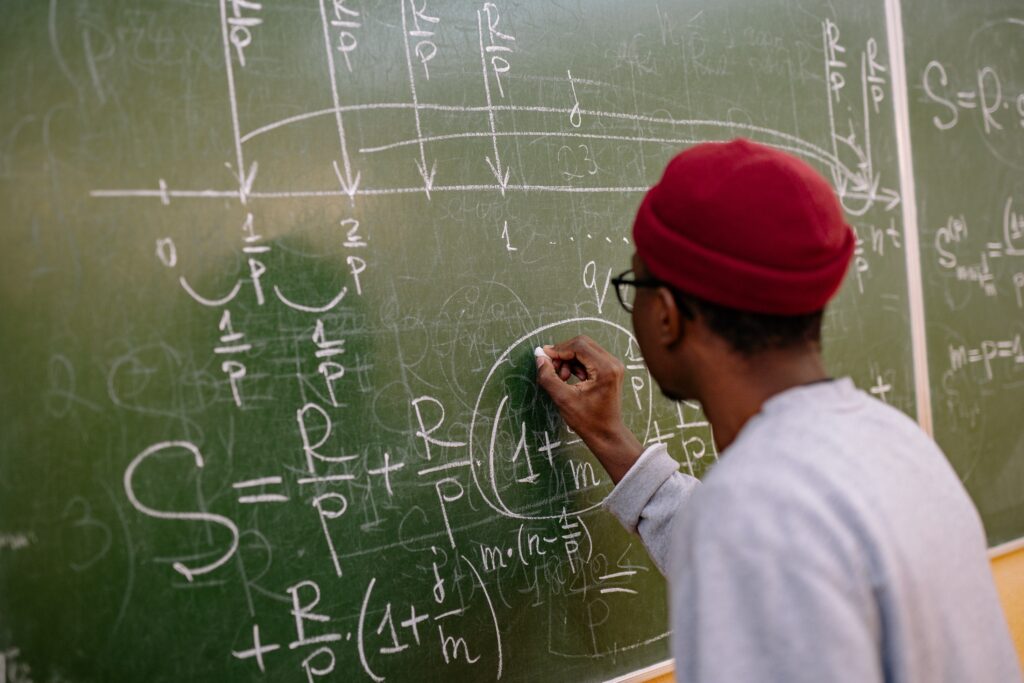So, you’ve studied all you can for Physics and now you need to know what to do the night before your VCE Physics exam?
You’ve come to the right place — here are our 7 tips to help you pack as much studying as possible into this final session, and hopefully get you the best result possible!
So, let’s dive in!
Tip #1: Syllabus Dot Points
Tip #2: Write a short summary
Tip #3: Skim-Read Past Exams
Tip #4: Tackle Multiple-Choice Questions
Tip #5: Work on your Summary Sheet
Tip #6: Create an Attack Plan
Tip #7: Get Some Sleep!
Tip #1: Syllabus Dot Points
First, you want to get an idea of where your strongest and weakest areas are. The best way to do that is by going through each point of the VCE Physics syllabus, and writing any dot points that come to mind.
Excerpt of Unit 3 in the VCE Physics Study Design from VCAA
Tip: To boost your memory, handwrite your points on a piece of paper! The University of Toyko indicates that using handwriting improves recollection.
Try to get these points out as quickly as possible, don’t sit there trying to recollect knowledge you don’t know!
This task is simply aimed at helping you to recollect and reinforce what you have already learnt — so don’t worry if you can’t remember something, just move on to the next point.
For example, under “Transmission of electricity”, you might write:
- Transformer equation : V1/V2 = N1/N2 = I2/I1
- Power loss = I2 R
- Higher voltage => lower power loss
Once you’ve gone through the entire syllabus, try to identify your weak points. These are the points you can focus on in the next task.
Tip #2: Write a Short Summary
Following on from the exercise before, the goal here is to write a summary to cover all the weaknesses you identified.
Focus on copying equations and writing concise facts.
For example, for Newton’s laws of motion, you could write “Newton’s third law: every action has an equal and opposite reaction.”
By doing this, you will build in a fresh memory of the content that you didn’t recall, which will improve your recollection for the exam tomorrow!
Tip: Make sure that your summary sheet for these areas is up to snuff as well, since you’ll be relying on your notes to help answer these questions.
Tip #3: Skim-Read Past Exams
For this task, you want to access the previous VCE Physics exams and quickly answer them.
Just write a dot point or two for each question — if you can’t think of anything to write for a question, just move on to the next one.
Make sure to pay attention to the marks awarded for each question: if you have a 3 mark short answer question, that means they want at least 3 points, so you should include at least 3 dot points to get full marks.
You should try and get through the exam fairly quickly. As a rough calculation, aim for taking about 60-90 mins to provide dot points for every question.
Once you’re done with this, use the examination report to:
- Compare your dot points to the answers given in the examination report. This will help give you an idea of what response is wanted for each question.
- Note the common errors given in the answer, and also the steps they wanted to see in the answer.
- Note the average marks awarded for each question, as this will give you an idea of which questions are easiest!
Tip #4: Tackle Multiple-Choice Questions
Now you should be ready to try and complete some multiple-choice questions.
The goal here is to get through as many questions accurately in a short period of time. Try to spend less than one minute on each question.
A good way to do this is by completing all the multiple choice questions on a single practice exam, and then going back through to see where you did well and where you went wrong.
Try to get through at least 60 questions (so 3 past exams). This should be enough to give you a broad coverage of all the content.
Tip #5: Work on your Summary Sheet
Now that you’ve gone through some more revision you should have a good idea of where you’re the strongest and where you’re the weakest.
Make sure to update your summary sheet accordingly, paying particular attention to any areas where you weren’t sure how to use it.
Remember that it’s not enough to just have notes, you also have to be able to use them in an efficient and effective manner:
- Make sure that there are no errors in your summary sheet
- Consider altering parts where the meaning is not exactly clear
- Focus on making smaller changes, anything that you think will help you tomorrow.
Tip #6: Create a Plan of Attack
Before you go to bed, you should decide the order you’re going to complete the exam in.
Try and focus on completing areas that are easy and that you’re proficient in first, before moving on to the more challenging areas.
It can also help to get the multiple choice out of the way first, as this is usually a quick way to get marks. Then focus on the questions you can answer straight away without thinking. After that, you can move on to the rest.
Tip #7: Get Some Sleep!
The most important thing you can do for yourself tomorrow is to get enough sleep tonight!
Getting a good night’s sleep has a significant effect on your recollection and focus, so make sure to get at least 8 hours of sleep so you can wake up feeling refreshed tomorrow.
Even if you haven’t finished studying, getting a good night’s rest is going to be more important than finishing the last 4 multiple choice questions, so just go to bed!
If you have a bit of time tomorrow morning, you can do some more revision before the exam. At this point, the best strategy is to just review your notes, and consider going through some more questions and answers from the practice exams.
After completing all this you’ll be in the best position possible to tackle your VCE Physics exam.
And, that’s all!
Check out more of our resources and guides to VCE Physics exam:
- VCE Physics External Assessment Practice Questions — Short Answer
- VCE Physics Multiple Choice Practice Questions For External Assessment
- The Ultimate Guide to Creating a Scientific Poster for VCE Physics
- How to Ace Your End of Year Exam for VCE Physics
- The Definitive Guide to Effectively Using the VCE Physics Formula Sheet
- The Ultimate Guide to Units 1 and 2 VCE Physics
- The Ultimate Guide to Units 3 and 4 VCE Physics
Got your Chemistry exam to prepare for too? Learn how to use the VCE Chemistry data booklet effectively.
Are you looking for some extra help with preparing for your VCE Physics exam?
We have an incredible team of VCE tutors and mentors!
We can help you master the VCE Physics study design and ace your upcoming VCE assessments with personalised lessons conducted one-on-one in your home or online! Get booked in with one of our expert VCE Glen Waverley tutors today!
We’ve supported over 8,000 students over the last 11 years, and on average our students score mark improvements of over 20%!
To find out more and get started with an inspirational VCE tutor and mentor, get in touch today or give us a ring on 1300 267 888!
Scott McColl is a content writer with Art of Smart and a Civil Engineering student at Monash University. In between working and studying, Scott enjoys playing music and working on programming projects.






